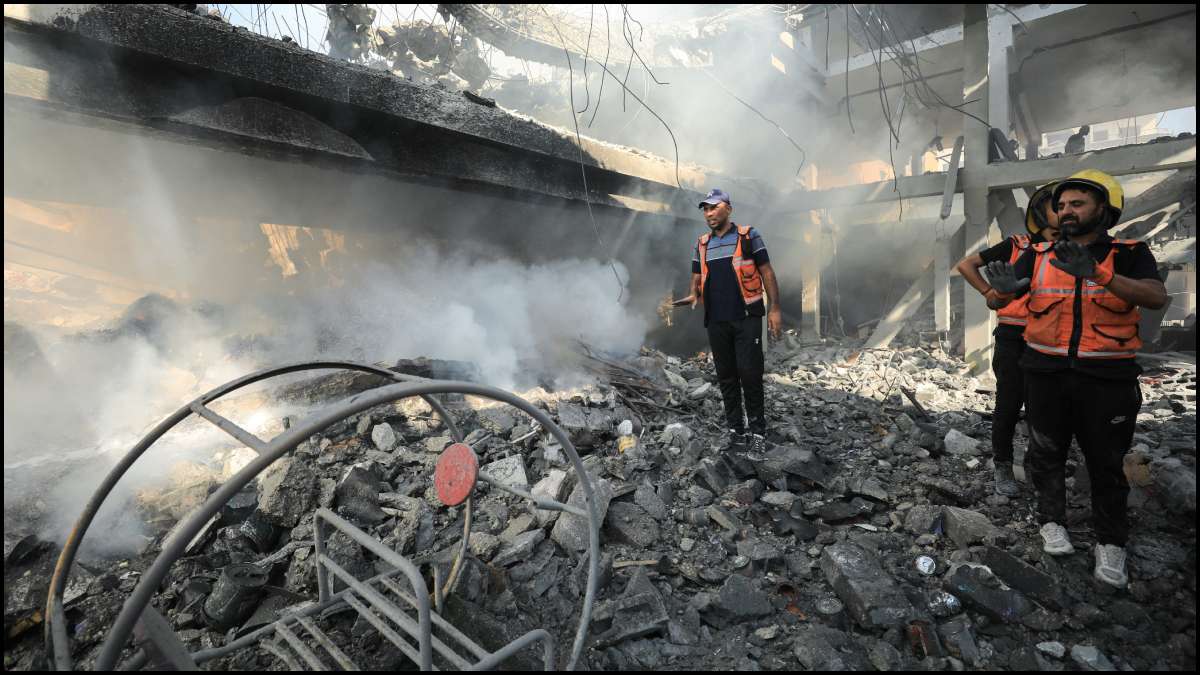
Jerusalem: An Israeli strike on a tent camp in Gaza for displaced Palestinians has killed at least 40 people while injuring 60 others, according to authorities, as ceasefire talks in the 11-month war has failed to yield any breakthrough. Residents and medics said a tent encampment near Khan Younis in the Al-Mawasi area, a designated humanitarian zone, was struck by at least four missiles.
The Israeli military described the strike as hitting “significant Hamas terrorists who were operating within a command-and-control centre,” without immediately providing additional evidence. The area is home to many Palestinians displaced by the Israel-Hamas war in which the Israeli military has devastated the wider Gaza Strip after Hamas’ October 7 attack on Israel.
Hamas in a reported statement denied Israeli claims, though Israel long has accused Hamas and other militants of hiding in civilian populations. Israel has launched strikes in and around Mawasi in the past, even as hundreds of thousands of Palestinians now live there. The Israeli military said it used “precise munitions, aerial surveillance and additional means” it did not immediately describe to limit civilian casualties.
“Our teams are still moving out martyrs and wounded from the targeted area. It looks like a new Israeli massacre,” a Gaza civil emergency official said. Ambulances raced between the tent camp and a nearby hospital, while Israeli jets could still be heard overhead, residents said.
Israeli attack on Syria
This came after overnight Israeli strikes killed 18 in Syria and wounded dozens, according to Syria’s health minister on Monday. One of the sites targeted was a research centre used in the development of weapons, a war monitor said. Syrian officials said civilian sites were targeted.
Israel regularly targets military sites in Syria linked to Iran and the Lebanese militant group Hezbollah. Those strikes have become more frequent as Hezbollah has exchanged fire with Israeli forces for the past 11 months against the backdrop of Israel’s war against Hamas — a Hezbollah ally — in Gaza.
Israel-Hamas ceasefire talks
The two warring sides each blame the other for a failure so far to reach a ceasefire that would end the fighting and see the release of hostages. Israeli Prime Minister Benjamin Netanyahu, who is under immense pressure at home and abroad, says he will only agree to a permanent ceasefire in Gaza if Israel is given open-ended control of Gaza’s border with Egypt so that Hamas can never use it to achieve its nefarious objectives.
Last week, the United States said it was putting forward a new proposal for a Gaza ceasefire and the release of hostages by Hamas in the coming days, which aims to work out the major sticking points behind a months-long impasse in talks mediated by the United States, Qatar and Egypt.
The war has caused vast destruction and displaced around 90 per cent of Gaza’s population of 2.3 million, often multiple times. Gaza’s Health Ministry says over 40,000 Palestinians have been killed in Gaza since the war began, when Hamas-led militants killed some 1,200 people, mostly civilians, in their October 7 attack on Israel.
India’s position on Israel-Hamas war
India’s External Affairs Minister S Jaishankar, who spoke at the India-Gulf Cooperation Council (GCC) Ministerial Meeting for Strategic Dialogue in Riyadh, Saudi Arabia on Monday, said the current situation in Gaza is India’s “foremost concern” and that New Delhi supports a ceasefire “as soon as possible” in the region.
“The current situation in Gaza is now understandably our foremost concern. India’s position in this regard has been principled and consistent. While we condemn acts of terrorism and hostage taking, we are deeply pained by the continuing death of innocent civilians,” he said. Jaishankar said that any response must take into account the principles of humanitarian law.
Jaishankar said India has consistently stood for a resolution of the Palestinian issue through a two-state solution. India has also contributed to the building of Palestinian institutions and capacities, he added.
(with inputs from agencies)
ALSO READ | Israel closes its land border after Gunman crossing from Jordan kills three of its citizens